Editorial
The theme of this issue is the work Salesians are doing, in so many parts of the world, for refugees. Our Salesian missionary work began with refugees. During the 19th century, when people were fleeing Europe to find a new life in the Americas, Don Bosco sent missionaries to look after them. His first Salesian missionary expedition was to Argentina. He instructed them to send one part of the mission band to Patagonia to work among the Indians, and another group to take care of the immigrants in the slums of Buenos Aires. The two provinces in the United States were started as projects to care for the Italian and Polish migrants. The Salesian presence on the East Coast of the USA began in 1898. The parish of St Peter and Paul in San Francisco began just before that and now has a large Chinese community. The migrants there also come from Porto Rico, Cuba, and the Dominican Republic.
So often we meet people who believe the many myths about refugees, fed them by the tabloid press. The facts are that the world's poorest countries both produce and bear responsibility for most refugees. During 1992-2001, 86 per cent of the world's estimated 12 million refugees originated from developing countries, whilst such countries provided asylum to 72 per cent of the global population. (Source: UNHCR - United Nations High Commissioner for Refugees). If you consider global refugee and asylum seeking populations in relation to the host country's size, population and wealth, the UK ranks 32nd. Taking the greatest burden are Iran, Burundi and Guinea. It is in some of the world's poorest countries that Salesians are to be found working for and with refugees.
We begin this issue with the second part of Fr Michael Cunningham's article on Friendship. In the context of refugees this is a good way to start since the best thing we could offer refugees is genuine friendship.
As always there is news of our latest publications because Don Bosco really believed in the ministry of good books. He once wrote to his Salesians,
I want to see you grow in zeal and in merit before God, every day, and so I will not hesitate to suggest to you from time to time various means which I believe to be an improvement, so that your ministry will be more fruitful. Amongst these, one that I want to warmly recommend to you, for the glory of God and the good of souls, is the spreading of good books.
As always we conclude by remembering those of our Salesian Family who have recently died. The memory of our departed unites, in a love that will not pass away, those who are still pilgrims with those who are already resting in Christ.
Anthony Bailey SDB
Editor
Email: a.bailey@salesians.org.uk
Friendship - The Lost Gift Part 2
 One of the most significant changes in our understanding of spirituality today is the shift from the experience of authority to the authority of experience. As in so many other areas, this is a case of both/and rather than either/or. At the heart of the emphasis on experience is the neglected question of intimacy. Current culture falsely equates intimacy with genital experience and risks losing the true significance of intimacy in both human flourishing and the discovery of God's desire for an intimate relationship with all of us. To be intimate is to truly reveal the deepest core of my being to a significant other. Traditionally we have often separated human love from the love of God, seeing them as rivals. In our Salesian tradition St Francis de Sales rejects this kind of dualism: we have one heart by which to love God and to love others. The more we love, the more we receive the capacity to love. In this sense Jesus says, Ask and you shall receive. Sadly many prefer a God of duty and performance rather than a God who invites us into intimacy.
One of the most significant changes in our understanding of spirituality today is the shift from the experience of authority to the authority of experience. As in so many other areas, this is a case of both/and rather than either/or. At the heart of the emphasis on experience is the neglected question of intimacy. Current culture falsely equates intimacy with genital experience and risks losing the true significance of intimacy in both human flourishing and the discovery of God's desire for an intimate relationship with all of us. To be intimate is to truly reveal the deepest core of my being to a significant other. Traditionally we have often separated human love from the love of God, seeing them as rivals. In our Salesian tradition St Francis de Sales rejects this kind of dualism: we have one heart by which to love God and to love others. The more we love, the more we receive the capacity to love. In this sense Jesus says, Ask and you shall receive. Sadly many prefer a God of duty and performance rather than a God who invites us into intimacy.One of the best ways to discover the God of Jesus is through the gift of friendship. Although we desire friendship we also find it threatening. So we build walls around our fragile and wounded selves. This fear even extends to God and was behind much of the cult of sacrifice in religious history, which I mentioned in the first part of this article. There is in all of us a deep worry and anxiety about worthiness and acceptance. To me the whole notion of salvation touches on this need. It has been said that when God saves us he gives us space. This spaciousness is experienced not so much in the head as in the soul. It frees us to accept and embrace all aspects of our lives, the good and the bad, the light and the dark, the wheat and the weeds, all to be brought before the Lord for transformation.
The Easter liturgy offers powerful symbols. I am always moved by the ritual of placing the five grains of incense in the paschal candle. This reminds us, visually and graphically, that the risen Christ remains the wounded Christ who readily shows his wounds to the doubting Thomas. Thomas is the archetypal anxious human soul. Isn't it amazing that the glorified body of Jesus reveals his woundedness? We would expect the glorified body to be free of all imperfection. What a profound and deeply human spirituality!
I think that what Jesus is doing here is drawing us into the mystery of human relatedness. The Bible begins with a picture of perfect harmony between God, and man and woman, in the Garden. After the first sin this harmony is broken, and the rest of the Bible is written to demonstrate God's continuous searching for the restoration of this relationship. It climaxes in the revelation of the New Testament that God is Trinity, three in one, a perfect harmony and intimacy of love and life, into which all are invited.
The mission of Jesus of Nazareth is to draw us progressively into this relationship of intimacy. Many of us resist this invitation to love and communion, preferring a God of rules and regulations. We resist it because we feel unworthy. We are giving in to the lie of original sin, instead of the truth of original grace and blessing.
One of the best ways to unlock this fear of intimacy is through friendship. In our Salesian spirituality, our patron, St Francis de Sales, rejects the dualism that says that love of God and human love are two different loves. We only have one heart. Unfortunately all of us grow up wounded by our experiences of pain and rejection, even from the first moments of our lives. Inevitably even the most loving of parents also wound us; they cannot always be there to provide for all our physical and emotional needs. Their love is mixed with conditions. Even with the best will in the world the message is soon transmitted to me, a vulnerable child, that I am no longer loveable in myself. Instead I am led to believe that I am loveable if I meet the expectations of others, and behave in certain ways to meet and gain approval. This process may be necessary for social reasons, but it results in all of us creating a series of masks to hide our true feelings. This is strongly reinforced by a society that pushes us into performance, competition, hard work and efficiency. We slip very easily into a functional way of relating, not just in our work but also, and dangerously, in our personal relationships. The price is being paid in our neglected souls. The masks that we wear, to protect our vulnerable selves, are reinforced by the temptation to over-identify with our roles, as parents, husbands, wives, teachers, priests, brothers, sisters and so on.
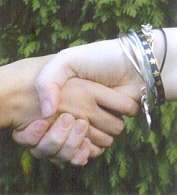 One of the great spiritual challenges of today is to recover a healthier balance, between the external world and our inner world. At the heart of this process is the need for intimacy: intimacy with God, intimacy with others and intimacy with ourselves. We need to recognise, connect with, and own our own feelings, in relationships and in prayer. Otherwise we may well be carrying anger, guilt or fear. These can translate into harsh and judgmental attitudes towards others. Friendship can help uncover some of these wounds, as we progressively reveal the deeper recesses of our hearts to someone who loves us, and likes us, because of who we are.
One of the great spiritual challenges of today is to recover a healthier balance, between the external world and our inner world. At the heart of this process is the need for intimacy: intimacy with God, intimacy with others and intimacy with ourselves. We need to recognise, connect with, and own our own feelings, in relationships and in prayer. Otherwise we may well be carrying anger, guilt or fear. These can translate into harsh and judgmental attitudes towards others. Friendship can help uncover some of these wounds, as we progressively reveal the deeper recesses of our hearts to someone who loves us, and likes us, because of who we are. Heterosexual friendships are especially important here. Men in particular will be much more inclined to reveal their inner selves to a trusted woman friend rather than a male companion. Such friendship was often frowned upon in our Christian tradition, by the fear that such relationships would lead to genital intimacy. In my early Salesian formation I often heard that warning. I can't recall anyone pointing out that a lifetime of personal isolation, and avoidance of intimacy, is also dangerous and impoverishing. The example of St Francis de Sales and Jane Francis de Chantal suggests a much more positive appreciation of friendship.
There is a further point. Our Catholic spirituality is incarnational, and yet we exhibit a deep fear and distrust of the body. Jesus loved to describe himself as the Son of Man, The Human One. He is the archetypal human being. Yet we allowed Stoicism, Manichaeism, Jansenism, Puritanism to distort the radical call to become human. We tried so hard to be spiritual and angelic, while Jesus wants to show us how to be fully human. It seems that Satan, the great Accuser, set out to attack us in our fragile bodies and fill us with guilt and shame, in the very area that God has embraced and transformed in becoming human. Perhaps, when Jesus underwent scourging in his passion, he was taking away some of our deep bodily shame and guilt. Too many of us are ill at ease in our bodies.
The world has grown tired of spiritual people. What it seems to be looking for are real human beings. What Christianity reveals is that we are all sons and daughters of God. Yet we remain flawed and vulnerable, scarred by the wounds of our imperfect world. In calling us friends and not servants, Jesus meets us and accepts us in the very heart of our flawed humanity. Today we see married couples who may be sexually intimate, but not emotionally intimate; young people who crave friendship, but are pushed by the culture into ever more early genital experience. We see priests and religious who may be sexually chaste but whose lives lack warmth and intimacy. The wounded risen Christ calls us to bring new life into these lifeless situations by acknowledging and sharing our wounds in healing friendships.
I call you friends because I have made known to you everything I have learnt from my Father. (John 15.15)
I have never seen or heard a better definition of intimacy.
Trust the Road by David O'Malley SDB
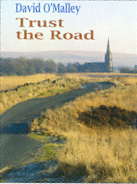 Towards the end of the Summer term, in secondary schools throughout the country, students in their last year of compulsory education, take leave of their school. They are at a crossroad in their lives. They face the road ahead with mixed feelings, outwardly delighted to be free of the discipline of school, inwardly apprehensive of the road ahead. The staff of the school has served them well for five or more years and now wishes them God speed on their journey. Many schools now have the opportunity to offer their departing pupils a roadmap for the way ahead. That road map is the book Trust the Road.
Towards the end of the Summer term, in secondary schools throughout the country, students in their last year of compulsory education, take leave of their school. They are at a crossroad in their lives. They face the road ahead with mixed feelings, outwardly delighted to be free of the discipline of school, inwardly apprehensive of the road ahead. The staff of the school has served them well for five or more years and now wishes them God speed on their journey. Many schools now have the opportunity to offer their departing pupils a roadmap for the way ahead. That road map is the book Trust the Road. This book is an encouragement for them trust their road. It comes from a Salesian tradition, inspired by the gentle humanism of St Francis de Sales. He would encourage you to trust the goodness within you and in those around you. Trust the tug of that mysterious presence within. Walk hand in hand with that hidden God who knows the road even when it goes towards the cross and through to new life.
The road of life unfolds each day in familiar patterns, new challenges and opportunities. Sometimes the pattern works out beautifully, at other times it makes as much sense as a game of snakes and ladders. Plans, relationships, work and choices all combine to make each life a unique journey. For Christians the challenge is to trust the road however it twists and turns.
Christians believe that, in the ordinary moments of each life, God is walking alongside each person. The goodness of God is locked into every life, and the gifts each person needs for their journey are already within them or available along the road ahead. The road takes each of us through time, but it is also eternal. The road takes us outwards, into a challenging world, but also leads us inwards, into who we really are. The road will take us out of ourselves, but deeper into relationship with others and the whole of creation.
Each of the experiences described in this book are moments on the road. Like the disciples who met Jesus walking with them after his resurrection, may your heart recognise God walking alongside you as you trust the road that lies ahead.
Over the last three years we have piloted this book in our Salesian schools. As a result of feedback from them, we have now produced this second edition for use in all schools. In the last few months secondary schools in many parts of the country have taken 5000 copies of this book. This is now the second edition The merits of this book have also been recognised in other parts of the world. There is already a German edition of Trust the Road. We are delighted that there are two schools in Germany who still have order the English edition for their students.
Stop at the crossroads, look carefully and ask yourself which path has proved most helpful over the years. Follow that path and you will find rest for your soul. (Jeremiah 6. 16)
THANK YOU, BATTERSEA! THANK YOU, BRITAIN!
 In mid-February this year, attending a Salesian Catechetical Convention in Rome, I was especially glad to meet a British Salesian, Fr Jim Gallagher. I was able to chat with him about mutual acquaintances and dear old places. As if in a flashback, I saw myself 66 years ago, a young foreign boy who couldn't speak a word of English, landing up at Salesian College Battersea, and beginning a new life as a Salesian pupil. As Graham Greene remarked in 'The Power and the Glory',
In mid-February this year, attending a Salesian Catechetical Convention in Rome, I was especially glad to meet a British Salesian, Fr Jim Gallagher. I was able to chat with him about mutual acquaintances and dear old places. As if in a flashback, I saw myself 66 years ago, a young foreign boy who couldn't speak a word of English, landing up at Salesian College Battersea, and beginning a new life as a Salesian pupil. As Graham Greene remarked in 'The Power and the Glory', There is always one moment in childhood when the door opens and lets the future in.
That cold, foggy evening in 1938 let my Salesian future in. Let me share with you my story.
I was born in pre-war Germany, into a family with Jewish roots. Soon after Hitler came to power, my family left for Italy. I was 7 years old: it wasn't easy to begin again with a new language, new friendships, and a new way of life. Eventually, after four difficult years, we managed to feel comfortable there. By then, however, Mussolini's Axis with Hitler had sounded the alarm: this time, it seemed wise to seek safety in a more remote country, in Brazil. The visa we applied for could take years to be granted, but time was ticking away for us. So we went to England, to wait and hope for the best. We were welcomed with open arms; but again, we had to face a new language, a rather difficult one at that, and leave behind so much we had acquired and cherished. As before, my father's serenity and strength helped us out.
Fr Biavati, the only Salesian we'd got acquainted with in Rome, had recommended us to Fr Tozzi, an Italian, then Salesian Provincial in London. So, on the 18th October 1938, I was admitted as a boarder at Battersea. I couldn't have found a better place. Fr Tozzi had been a pupil of Don Bosco and, of course, had many nice stories to tell us. He also taught me my first English words, kept an eye on my studies, and was always ready to listen to me. Also the Rector, Fr Couche, proved extremely understanding, helpful and kind. Bro Joseph, the only Salesian Brother I knew ever to wear a cassock, volunteered to be my daily teacher of English. Fr Milford was a Brazilian, who had asked to be transferred to England, because of constant opposition from his family to his vocation. Fr Klepl, as a young man, had changed from one Church to the other, in search of Truth. Not content with the choice his native Germany offered, he crossed the Channel. In England, at last, he found what he had been striving for: he became a Catholic, then a Salesian priest. Only after his death in 1939 did we boys learn about his long quest.
One of the high points at Battersea was the quality of education. I retain to this day much of what I learned there. Discipline was strong, but humane. Religion received special attention: prayers and celebrations, devotions in the month of May, catechism. I still have my copy of the Penny Catechism and the booklet of Popular Hymns, most of which are still fresh in my mind. Just one telling detail: decades before the Second Vatican Council, though times were still hard for papists, as Catholics were sometimes spitefully referred to, in our college I never heard an unpleasant remark about any religious group. No wonder I began to love Battersea, its relaxed educational climate, with an aura of common sense and joy. Before long, I no more wanted to be a doctor, like my father, but a Salesian priest.
Not only our college, but life in Britain as a whole, impressed me favourably. When the war broke out, people took it quite matter-of-factly. Our Battersea college was evacuated to Cowley in Oxford, where school life went on as usual. Everywhere, people were ready to help, even though they had many troubles of their own. I could tell many a good story about that. I found the British a wonderful people. It can't be sheer coincidence if, after so many years, I still enjoy some rather un-Brazilian staples, such as porridge, marmalade, or sipping afternoon tea.
Suddenly, when I had forgotten all about it, in June 1940, we received our visas for Brazil. Our Highland Monarch was one of the last ships to cross the Atlantic during the war. We departed again to yet another foreign land.
The Lord is my Shepherd; he leads me beside still waters.
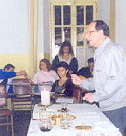 I was happy enough to find a Salesian college in Niterói, a city near Rio de Janeiro. Thank God, the last barrier had fallen. In January 1944 I was professed as a Salesian, and in December 1953 was ordained priest. I have spent my Salesian life in the formation of our Salesian students, Bible and Catechesis, and pastoral activity among the poor, so I constantly have something to learn from these my friends. I feel a Brazilian at heart. Even so, I consider Battersea a turning point in my life. At first, having to restart time and again in unfamiliar cultures hurts you, even makes you feel despondent. With due care, however, despondency can lead to new awareness and broader horizons. I think that's just what I owe Battersea: my education there helped me to better understand the breadth and length and height and depth - the love of Christ. (Eph. Chapter 3).
I was happy enough to find a Salesian college in Niterói, a city near Rio de Janeiro. Thank God, the last barrier had fallen. In January 1944 I was professed as a Salesian, and in December 1953 was ordained priest. I have spent my Salesian life in the formation of our Salesian students, Bible and Catechesis, and pastoral activity among the poor, so I constantly have something to learn from these my friends. I feel a Brazilian at heart. Even so, I consider Battersea a turning point in my life. At first, having to restart time and again in unfamiliar cultures hurts you, even makes you feel despondent. With due care, however, despondency can lead to new awareness and broader horizons. I think that's just what I owe Battersea: my education there helped me to better understand the breadth and length and height and depth - the love of Christ. (Eph. Chapter 3). In May 1940, at Cowley, I was in the choir; and one song we sang with special thrill (during the war!) was a medley including Land of Hope and Glory, followed by
and England shall be free
if England means as much to you
as England means to me.
I can't forget that medley; time and again, while I hum it to myself, I realize what England means to me. I left England over 60 years ago, but never quite got England out of my heart and mind.
Today, I consider the gap-year experience of the Salesian Volunteers a convincing proof that, in Britain, business goes on in new ways, a promise of ever wider horizons for Salesians worldwide.
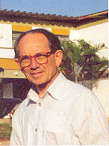
Wolfgang Gruen, SDB April 2004.
Reflection
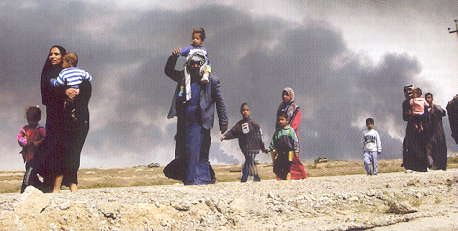
Dark clouds of despondency
For the child become the refugee
Burdened and weary?
He said, Come to me!
Welcoming Refugees in Korea
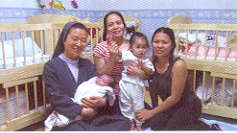 I was sent as a missionary from the United States to Korea. From 1968 onward I was chaplain to the YCW (Young Christian Workers) in southern Seoul. At that point there was internal migration. Korea's population was more that 80% rural and as the country industrialized young people left the rural areas for the cities, especially Seoul. We Salesians responded to this massive internal migration by setting up training centres and hostels to welcome young people looking for jobs. The Salesian Sisters did the same.
I was sent as a missionary from the United States to Korea. From 1968 onward I was chaplain to the YCW (Young Christian Workers) in southern Seoul. At that point there was internal migration. Korea's population was more that 80% rural and as the country industrialized young people left the rural areas for the cities, especially Seoul. We Salesians responded to this massive internal migration by setting up training centres and hostels to welcome young people looking for jobs. The Salesian Sisters did the same. By 1983 I had become the YCW national chaplain, a job I held till 1985. In the meantime Cardinal Kim asked me to organize a Labour Pastoral Commission for the Archdiocese of Seoul. Gradually the work of the Commission reached out to Korean workers who couldn't get legal redress under the military dictatorship.
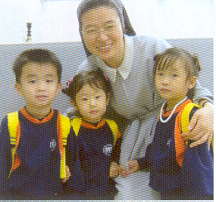 In 1988 Seoul hosted the Olympic Games. Ordinary working people, from developing countries in Asia, saw Korea as a place to find relatively high-paying jobs. Migrant workers began to drift into the country on tourist visas and for other bogus reasons. By 1992 our Commission felt the need to open a Counselling Office for migrant workers. Immediately we were inundated with requests, to get help for unpaid wages, compensation for industrial accidents, arbitration in cultural misunderstandings and just friendship on Sundays and holidays.
In 1988 Seoul hosted the Olympic Games. Ordinary working people, from developing countries in Asia, saw Korea as a place to find relatively high-paying jobs. Migrant workers began to drift into the country on tourist visas and for other bogus reasons. By 1992 our Commission felt the need to open a Counselling Office for migrant workers. Immediately we were inundated with requests, to get help for unpaid wages, compensation for industrial accidents, arbitration in cultural misunderstandings and just friendship on Sundays and holidays. In 1996 we opened up a shelter for sick and injured migrant workers, who needed a place to rest after industrial accidents or sicknesses. Hundreds of workers, from various countries, have used the shelter. Last year Alexander, a Russian from Siberia, was the victim of a hit-and-run car accident. Two cars passed over his leg. The leg had to be amputated. After leaving hospital he needed a place to rest and a prosthetic so that he could walk without the aid of crutches. A Franciscan Missionary of Mary persuaded a group of her former pupils to pay for the prosthetic. Alexander was able to return to Russia with an artificial leg and the knowledge that people were concerned for him.
Migrants from Thailand
Working with us is a Thai lay missionary who helps the Thai workers in Korea. We know that over 95% of Thai workers are Buddhists. We hope to show them the compassionate face of Christ in their moments of need. A young Thai worker brought his wife to us. After a year or so in Korea this young woman, in her mid-twenties, began to act strangely, evidently a victim of extreme culture shock. Living in sub-zero weather, after having lived all her life in the tropics, had affected her health. Fortunately we were able to find a competent Catholic psychiatrist who agreed to treat her and got her ready for a six-hour flight back to Thailand. There are cases similar to this day after day, and week after week. We have handled about 20,000 cases in our office since 1992 and about 900 people have used our shelter since 1996.Migrants from the Philippines
Just the other day I visited Ganny, a Filipino1 who lost three of his five fingers in a press machine accident. The day I visited him Ganny told me that he had just turned 32. He's waiting for compensation from the Labour Office and he'll return to the Philippines and try to open up a little shop to support him and his family. Ganny had already worked in Saudi Arabia and Taiwan. When I told Sister Scholastica who runs the shelter it was Ganny's birthday, she bought a little cake and celebrated with him. Sister Scholastica is a Caritas Sister, a congregation founded in Japan by the Venerable Monsignor Cimatti and Fr Cavoli, Salesian missionaries sent to Japan in the 1920s. The Caritas Sisters are now the largest female congregation in Japan and number almost 400 members here in Korea.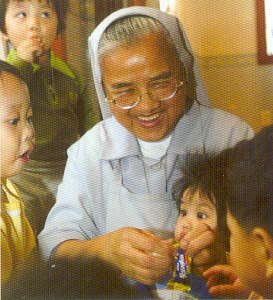 Recently we opened the Bethlehem House, a shelter for the children of Korean fathers married mostly to Philippine women. When problems surface in these marriages, the women flee to the Philippine Catholic Community in Seoul. We take care of the children until the families are reunited, or until the mothers can work, put aside some money and can arrange for their children to re-enter the Korean social system. At present we have 12 children in this programme and 50 waiting to enter. The Salesian Sisters have agreed to run the Bethlehem House. The Philippine Catholic Community has about 1500 to 2000 people at Mass every Sunday in an easily accessible parish in the heart of Seoul. The Filipinos have two Philippine priests working full time with them as well as Sr Michaela Santiago FMA, who has been in Korea for 47 years and was one of the pioneers of the Salesian Sisters' work in Korea.
Recently we opened the Bethlehem House, a shelter for the children of Korean fathers married mostly to Philippine women. When problems surface in these marriages, the women flee to the Philippine Catholic Community in Seoul. We take care of the children until the families are reunited, or until the mothers can work, put aside some money and can arrange for their children to re-enter the Korean social system. At present we have 12 children in this programme and 50 waiting to enter. The Salesian Sisters have agreed to run the Bethlehem House. The Philippine Catholic Community has about 1500 to 2000 people at Mass every Sunday in an easily accessible parish in the heart of Seoul. The Filipinos have two Philippine priests working full time with them as well as Sr Michaela Santiago FMA, who has been in Korea for 47 years and was one of the pioneers of the Salesian Sisters' work in Korea. Migrants from Peru
Fr Molero SDB, one of the pioneers of the Salesian Mission in Korea, helps Latin American workers, mostly Peruvians with retreats. He also fills in for Masses when Fr Michel is unable to take care of all the Masses.Migrants from Vietnam
Fr Pham SDB has come from Vietnam to take care of the Vietnamese Catholic Community. He has about 150 young Vietnamese workers at his Sunday Mass every week, as well running a catechetical programme. We sometimes joke with him saying that he's freer to work here for Vietnamese young people than in his own country.Migrants from China
Fr Francis Kim SDB has a shelter and counselling office for ethnic Koreans from China and Pure Han Chinese workers. Fr Francis is over 60 and puts in long days to help the Chinese workers.As for me, I'm the coordinator of all these activities, as well as the YCW chaplain for Asia. I have to talk with government officials and lobby for the work we do. Many of the activities we run are supported by donations from Korean Catholics and many non-Christians as well. From 2002 I moved to a new job, Ministry to Migrant Workers in the Seoul Archdiocese. I work with two diocesan priests. Fr. Andrew Haw is now the chairperson of the LPC and Fr Simeon Lee is the Director of the Labour Pastoral Centre.
From the beginning of 2002 we no longer run a Labour Counselling Office for local workers. The Labour Ministry is now a part of a democratic government, and local workers no longer needed our counselling services. We do have a very interesting mini-programme for former miners, dying of black lung disease and suffering from other industrial diseases. This is run by a Korean Prado Sister and other volunteers.
We have a lot of volunteer workers helping us. They range from college kids to retired elderly people. Catholics, who know foreign languages, help us with their linguistic expertise. Our office has handled cases from migrants from over 50 countries over the past 12 years.
Fr Jack Trisolini SDB
Welcoming Refugees Worldwide
Eritrea
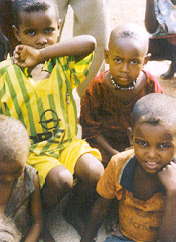 The Salesians in Dekemhare have opened the doors of their new college to the thousands of Eritrean refugees now being expelled from Ethiopia. The ongoing conflict between the two nations has culminated in the deportation of more than 20,000 Eritreans already, breaking up families, and forcing them to abandon their possessions and sometimes sadly, their children.
The Salesians in Dekemhare have opened the doors of their new college to the thousands of Eritrean refugees now being expelled from Ethiopia. The ongoing conflict between the two nations has culminated in the deportation of more than 20,000 Eritreans already, breaking up families, and forcing them to abandon their possessions and sometimes sadly, their children. The new college will be able to house about 2000 of these refugees and the Salesians are glad to do it. Fr Angelo Regazzo writes,
I would have never thought that Divine Providence would have reserved for us the privilege of using this school for those being deported. It is very moving to see the statue of Don Bosco in the corridor surrounded by mattresses, matting, bags and all sorts of rags. He smiles on them and blesses them.
The refugees arrive at the shelter in a pitiable state. In three or four days, they are registered, receive a little money, two blankets and some cooking utensils, and are then sent off to join relatives or friends. In addition to the immediate assistance, the Salesians are also running courses in typing and basic computer skills for about 130 boys and girls who are unable to find employment.
Angola
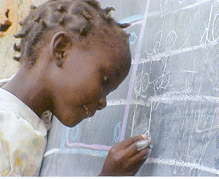 After 20 years of fighting, Angola is a country that has been devastated by malnutrition and the destruction of war. It is estimated that there are still 15 million unexploded landmines. The internal refugee problem has still not been resolved. The Salesians began caring for internal refugees at a camp at Lwena. In the year 2000 there were 7000 refugees needing food, clothing, medical care and training. At the beginning of 2002, with the death, on 22nd February, of the rebel Leader Jonas Savimbi, the flow of refugees increased. The Angolan government and the relief agencies decided to open a Transfer Centre for internal refugees, and responsibility for it was given to the Salesians of Don Bosco. Fr Santiago Christophersen writes,
After 20 years of fighting, Angola is a country that has been devastated by malnutrition and the destruction of war. It is estimated that there are still 15 million unexploded landmines. The internal refugee problem has still not been resolved. The Salesians began caring for internal refugees at a camp at Lwena. In the year 2000 there were 7000 refugees needing food, clothing, medical care and training. At the beginning of 2002, with the death, on 22nd February, of the rebel Leader Jonas Savimbi, the flow of refugees increased. The Angolan government and the relief agencies decided to open a Transfer Centre for internal refugees, and responsibility for it was given to the Salesians of Don Bosco. Fr Santiago Christophersen writes,The community accepted the challenge, and we began offering hope again to those who had lost it. At the end of the war, distributing food in the refugee camps did not prevent our pastoral work. The people were able to receive the sacraments for the first time for many years. We were looking after 15000 people for whom we then began to provide simple lessons, in reading and writing for the adults, and a youth club for the children. In March 2002, the government again asked us to open up the centre for the former soldiers of UNITA and their families. In one month 22 babies were born, and all were given names of Salesian saints, since the parents asked for suggestions. In August 2002, we were asked to accept Angolan refugees coming from the Congo and from Zaire. Recently the Centre has taken in another 1200 people. The refugees can have a bath, three meals a day, and receive instruction about the dangers of landmines, the prevention of AIDS. The children can go to school to learn something.
Australia
From boat person to award winning counsellor, Fr Binh's life has been one of constant energy and achievement. Last year, he and his team, Centacare Catholic Family Services, turned that dynamism into a programme that won accolades from Australia's Heads of Government.As a 20-year-old refugee, he fled his native Vietnam on an old boat, and ended up briefly in Malaysia, before being granted refugee then residential status in Australia. There he joined the Salesians and was ordained in 1992. Over the years Fr Binh became prominent on the radio, focusing on family problems in ethnic communities.
The programme, Managing Anger in the Vietnamese Family, has been awarded a Certificate of Merit in the Australian Violence Prevention Awards, presented by the Australian Heads of Government. The programme is based on research showing links between violence, migratory and ethnic experience. It involves groups working in sessions over 12 weeks with a number of techniques, including personal story-sharing, exploring abuse and respect, parenting and children in different cultures, traditional Vietnamese heroism stories, listening and communication skills, and problem solving.
Fr Binh said the development of the pilot project, while difficult, showed that, with ethnically sensitive planning and resources, further programs could be refined to deal effectively with a disturbing problem. While carrying out this demanding and successful role, Fr Binh also teaches music just as successfully at the local Salesian College, St Joseph's, attached to his Salesian Community at Ferntree Gully.
Pakistan
Fr Peter Zago, has been a missionary for 44 years. He has worked in India, Philippines and Papua New Guinea. He is now working in Pakistan where many people, including the Ministry of Education in Islamabad, recognise the value of the education offered in Don Bosco's name.There are six Salesians in Pakistan, three in Quetta and three in Lahore. Quetta is just 100 or so kilometres from the border with Afghanistan, where thousands of refugees are to be found. For the past two years the Salesians have run the parish in Quetta, for some 1200 Catholic families. But the work extends far beyond these religious confines. There is a youth centre open to all youngsters, and especially the young Uzbek refugees. With financial assistance from the Rector Major and the Bonn Mission Office, the Salesians run a school for 120 Uzbek youngsters, and a further Learning Centre for some 650 Afghan refugees.
An approach was made to the Salesians to manage three separate learning centres for the Pashtun, Azari and Tajid refugee camps. The Salesians manage these three centres and reach out to 1800 young people. They provide educational materials, one meal a day and other facilities such as toilets and water. Local people staff the centre and receive training and guidance from the Salesians. The Salesians also provide a teacher to teach English for an hour a day. Altogether, between the Uzbek Learning Centre and the other refugee camp centres, the Salesians are responsible for around 50 teachers.
This relatively new Salesian presence in Pakistan has made a favourable impression on Government officials who welcome assistance from the private sector. The local Bishops have been likewise impressed. There is already a potential presence in Rawalpindi, with buildings on offer, if only the Salesians can staff the enterprise. Fr Zago was never one to allow difficulties and challenges to hinder Don Bosco's contribution to the poorest of young people. He radiates warmth and hope for the future.
Italy
The Philippino Community, based at the Sacred Heart Church in Rome, celebrated its 25th anniversary on 25th January this year. The community was founded with the help of the Salesians who continue to support them. From a tiny nucleus back in 1979, then the only organised group of Filipinos in the city, the community has now grown into a large gathering, celebrating Mass each Sunday, meeting in different prayer groups, preserving their culture, and providing human and Christian formation to its members.Austria
Recently the Salesian Family in Vienna has begun to help the many young refugees living on the streets of the city. Some of them have just seen the snow for the first time in their lives. The Austrian Salesian Family hope to make a contribution towards providing appropriate support for children and young people: somewhere to live and someone who cares for them. Fr Bernhard Vondrasek SDB writes,We want to help them to build a future to which they are entitled, especially those who have left their own country, without their parents, and who now need our help here in Austria.
This is a response by the Salesians and the Daughters of Mary Help of Christians to the current situation. Fr Vondrasek reminds us that this is precisely the kind of work Don Bosco did 150 years ago, when he welcomed street children into his own home. The first project was called Tobias, a bus staffed by teachers and volunteers visited the youngsters in the areas where they are struggling to live. Tobias provides educational games and creative workshops. They are planning a new project for 16 refugee children, to be called Jonathon, based in an apartment in the Salesian parish of Vienna-Inzersdorf.
Moving On by Margaret Joan Cooke
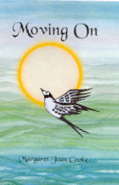 These poems are as varied in the topics they address as they vary in style from the sombrely thoughtful to the playful. All are rooted in the actualities of daily life, often in the familial and social cohesiveness which Joan experienced while growing up in Bolton. They are also keenly responsive to the natural world, to the sea and the various landscapes of Ireland and Scotland.
The finely observed detail and sensitive reflections are expressed in language made alive by its rhythms and images, deftly shaped and controlled. The relaxed colloquial tone can deal with jokiness and with the deeper realities Joan was so much aware of, life, death and spirituality. It is the sense of affirmation arising from her confident faith that forms the lasting impression made by these poems.
These poems are as varied in the topics they address as they vary in style from the sombrely thoughtful to the playful. All are rooted in the actualities of daily life, often in the familial and social cohesiveness which Joan experienced while growing up in Bolton. They are also keenly responsive to the natural world, to the sea and the various landscapes of Ireland and Scotland.
The finely observed detail and sensitive reflections are expressed in language made alive by its rhythms and images, deftly shaped and controlled. The relaxed colloquial tone can deal with jokiness and with the deeper realities Joan was so much aware of, life, death and spirituality. It is the sense of affirmation arising from her confident faith that forms the lasting impression made by these poems.John Cassidy
Poet
As several poems had already appeared in literary magazines, Joan, after much persuasion, eventually consented to having all her poems collected and published. She died in September 2003, knowing that plans for this book were already under way. It is a fitting tribute to one so gifted that these poems can now be shared by everyone.
Hardcover 67 pages. Black & white illustrations by Val O'Brien
Price £5 + £1.25 p & p. See order form on back cover.
Serving the Young - Our Catholic Schools Today by Jim Gallagher SDB
 In Serving the Young, Jim Gallagher focuses on aspects of the religious dimension of education in a Catholic School: an educational community inspired by Christian faith and beliefs about people, life and the world. His main sources are the directives and guidance set out in Church documents. He also draws on his own experience, over the years, in a variety of roles within Catholic education.
In Serving the Young, Jim Gallagher focuses on aspects of the religious dimension of education in a Catholic School: an educational community inspired by Christian faith and beliefs about people, life and the world. His main sources are the directives and guidance set out in Church documents. He also draws on his own experience, over the years, in a variety of roles within Catholic education.Many people find difficulty reading the Church texts on the nature and purpose of education, especially when they seem to be written in theological language. It is not always easy to set aside time for such reading and reflection in the busy schedule of our schools. However there are many hidden treasures in these texts and writings. They can and do inspire and challenge us to explore in greater depth the nature and purpose of education in a Catholic School. They may help us to re-examine some distinctive features of the education which we should seek to provide in our schools. This is particularly necessary in these times of constant and rapid developments and changes in society, the Church and educational policy. Anyone who has responsibility for, or works in our Catholic School will find this book both instructive and inspiring.
Paperback 72 pages. Black & white illustrations by Val O'Brien.
Price £5 + £1.25 p & p.
Fr Eric Darwell SDB 1935 - 2004
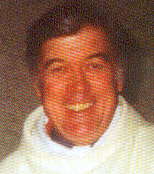 Eric was born in Leigh, Lancashire. After studying at Bollington, and teaching at Shrigley, he was ordained in the Basilica of Mary Help of Christians in Turin, Italy in 1963. After studying for a further year in Rome he taught in Shrigley, Bolton and Blaisdon. His cheerfulness and ability to relate so well in friendship made him a natural choice as Vocations Director for the Salesians, a responsibility he held for 11 years. He organised the annual vocation days at Walsingham, gathering hundreds of young people from all over the country in prayer and song. During this time he was well known for his involvement in the Caring Church. One of his great loves was the annual HCPT pilgrimage to Lourdes, he led a dedicated group of helpers there for fifteen years. He spent 17 years of his priestly life at Chertsey, a period of seven years in the school, then later another ten years in the parish. He was a regular speaker at charismatic events for many years. Eric died on the 19th January 2004.
Eric was born in Leigh, Lancashire. After studying at Bollington, and teaching at Shrigley, he was ordained in the Basilica of Mary Help of Christians in Turin, Italy in 1963. After studying for a further year in Rome he taught in Shrigley, Bolton and Blaisdon. His cheerfulness and ability to relate so well in friendship made him a natural choice as Vocations Director for the Salesians, a responsibility he held for 11 years. He organised the annual vocation days at Walsingham, gathering hundreds of young people from all over the country in prayer and song. During this time he was well known for his involvement in the Caring Church. One of his great loves was the annual HCPT pilgrimage to Lourdes, he led a dedicated group of helpers there for fifteen years. He spent 17 years of his priestly life at Chertsey, a period of seven years in the school, then later another ten years in the parish. He was a regular speaker at charismatic events for many years. Eric died on the 19th January 2004.Fr Tom Carroll SDB 1918 - 2004
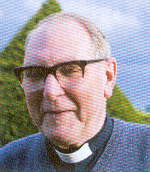 Tom was born in Chorlton-on-Medlock, Manchester. He received his secondary education at Xaverian College, where he decided to join the Salesians. His final profession took place at Shrigley in 1940. He taught in Shrigley and Thornleigh, and studied in Cowley and Blaisdon, where he was ordained on July 20th 1947. For the next 23 years Tom taught music and history at Salesian College, Battersea. Many are those to whom he communicated his enthusiasm for music, and whose musical talent he encouraged. From 1970 to 1971 he was Headteacher at Salesian College, Farnborough. He then taught at Shrigley and at Chertsey, before moving north to Savio House. This served as a base for a variety of apostolates: retreat chaplain, CTS appeals, promotion of the Turin Shroud, ministry at the Hidden Gem in Manchester and other parishes. Tom combined determination with kindness and gentleness, and was a person who easily won people's affection, a priest utterly devoted to his ministry. On January 15th 2004 Tom passed away in Adlington Manor Nursing Home near Bollington.
Tom was born in Chorlton-on-Medlock, Manchester. He received his secondary education at Xaverian College, where he decided to join the Salesians. His final profession took place at Shrigley in 1940. He taught in Shrigley and Thornleigh, and studied in Cowley and Blaisdon, where he was ordained on July 20th 1947. For the next 23 years Tom taught music and history at Salesian College, Battersea. Many are those to whom he communicated his enthusiasm for music, and whose musical talent he encouraged. From 1970 to 1971 he was Headteacher at Salesian College, Farnborough. He then taught at Shrigley and at Chertsey, before moving north to Savio House. This served as a base for a variety of apostolates: retreat chaplain, CTS appeals, promotion of the Turin Shroud, ministry at the Hidden Gem in Manchester and other parishes. Tom combined determination with kindness and gentleness, and was a person who easily won people's affection, a priest utterly devoted to his ministry. On January 15th 2004 Tom passed away in Adlington Manor Nursing Home near Bollington. Fr Philip Spratt SDB 1919 - 2004
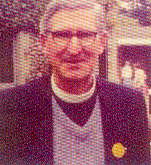 hilip was born in Southampton. He was educated at Shrigley. He was professed in 1939, and in a world sliding into war, went on the long journey to India. In 1949, he was ordained priest and worked for seven fruitful years in the Salesian parish in Bombay. He then worked in Poonamallee, where he also taught in the diocesan seminary. For reasons of health he returned to the UK in 1960. Philip returned to parish work at Chertsey. For most of the 27 years he was hospital chaplain. His kindness and dedication won the hearts and deepened the faith of the families in the parish, patients in hospital, and their relatives. He encouraged many converts, and won many friends. That spirit of encouragement was remembered, in the gentle reply he gave, when approached in the street by a person, who felt long separated from church worship: But you are still a child of God. In his mid-seventies, he retired to Farnborough. Philip died peacefully on Friday 27th February in Grayshott, Hampshire.
hilip was born in Southampton. He was educated at Shrigley. He was professed in 1939, and in a world sliding into war, went on the long journey to India. In 1949, he was ordained priest and worked for seven fruitful years in the Salesian parish in Bombay. He then worked in Poonamallee, where he also taught in the diocesan seminary. For reasons of health he returned to the UK in 1960. Philip returned to parish work at Chertsey. For most of the 27 years he was hospital chaplain. His kindness and dedication won the hearts and deepened the faith of the families in the parish, patients in hospital, and their relatives. He encouraged many converts, and won many friends. That spirit of encouragement was remembered, in the gentle reply he gave, when approached in the street by a person, who felt long separated from church worship: But you are still a child of God. In his mid-seventies, he retired to Farnborough. Philip died peacefully on Friday 27th February in Grayshott, Hampshire. Brother Gerald Clifton SDB 1920 - 2004
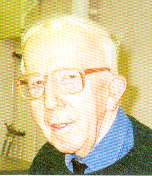 Gerry was born in Manchester. When he was six years old the family moved to Sydney, Australia, before returning to settle in Carlow in Ireland. He came over to Shrigley, and was professed as a Salesian brother in Blaisdon in 1940. Fr Hall, described the young Gerald in these words, He gives the impression of being simple. This is not the case! Those of us, who lived with Gerry, can recall many an occasion when, with a shrewd and humorous remark, he would sum up exactly what was going on. He was sent to Bolton in 1959 where he was to remain until his death. He lived a life of real and genuine service, carrying out innumerable acts of kindness in countless visits to people in need. His prayer life was deep and genuine. In 1998, St Joseph's, our residential home for our elderly Salesians, was opened. Gerry was one of the founding fathers, as it were. His gentle and charming smile endeared him to all. Gerry died peacefully in the Alexian Brothers Nursing home in Manchester on Thursday 11th March 2004.
Gerry was born in Manchester. When he was six years old the family moved to Sydney, Australia, before returning to settle in Carlow in Ireland. He came over to Shrigley, and was professed as a Salesian brother in Blaisdon in 1940. Fr Hall, described the young Gerald in these words, He gives the impression of being simple. This is not the case! Those of us, who lived with Gerry, can recall many an occasion when, with a shrewd and humorous remark, he would sum up exactly what was going on. He was sent to Bolton in 1959 where he was to remain until his death. He lived a life of real and genuine service, carrying out innumerable acts of kindness in countless visits to people in need. His prayer life was deep and genuine. In 1998, St Joseph's, our residential home for our elderly Salesians, was opened. Gerry was one of the founding fathers, as it were. His gentle and charming smile endeared him to all. Gerry died peacefully in the Alexian Brothers Nursing home in Manchester on Thursday 11th March 2004. Fr Paul McAleer SDB 1921 - 2004
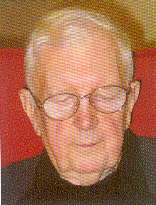 As a newly ordained priest Paul taught at Thornleigh. After 12 years there he moved to Shrigley. Three years later he moved to Battersea where he taught for the next 16 years. All those he taught recall his love for the Classics. He was an enthusiastic teacher, with the gift of sharing his passion for his subject. In his younger days Paul was a skilful footballer and never lost his interest in Celtic. Paul always had the spiritual interests of others very much at heart, and when he retired from teaching, he moved into parish ministry. Initially he did long-term supplies. When these became too demanding, Paul continued to make himself available for public Masses. At the end of 2000 Paul moved to Farnborough. His last months were largely spent in hospital. Even in his sickness Paul inspired compassion and kindness. To the very end Paul was always so grateful and appreciative for all that was done for him. He never took anything for granted. Paul died on the 22nd March 2004, at Frimley Park.
As a newly ordained priest Paul taught at Thornleigh. After 12 years there he moved to Shrigley. Three years later he moved to Battersea where he taught for the next 16 years. All those he taught recall his love for the Classics. He was an enthusiastic teacher, with the gift of sharing his passion for his subject. In his younger days Paul was a skilful footballer and never lost his interest in Celtic. Paul always had the spiritual interests of others very much at heart, and when he retired from teaching, he moved into parish ministry. Initially he did long-term supplies. When these became too demanding, Paul continued to make himself available for public Masses. At the end of 2000 Paul moved to Farnborough. His last months were largely spent in hospital. Even in his sickness Paul inspired compassion and kindness. To the very end Paul was always so grateful and appreciative for all that was done for him. He never took anything for granted. Paul died on the 22nd March 2004, at Frimley Park.Sister Maria Jacobs FMA 1924 - 2004
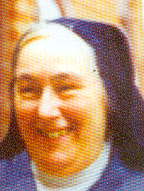 Maria was born in Holland. She felt called to the religious life, but since there was no community of Salesian Sisters in Holland at that time, she contacted the Sisters in Britain. In 1949 Maria asked to be admitted to the Salesian Sisters. She worked all her life in the Kitchen and the garden. A sister who was with her, in community over a number of years, remarked, She was very hard working, you could see that, but she was also very prayerful, you would find her in the Chapel whenever she was free. When a community of Salesian Sisters was opened in Holland and some Dutch Sisters returned to their homeland, Sister Maria opted to stay in England. As she grew older, it became obvious that she was losing her memory and her grasp of English. It was feared that she might become very isolated as her illness progressed. The North Belgian Province welcomed her in 1996 and she was able to live with the community in Maasniel, Holland. She died on April 13th 2004.
Maria was born in Holland. She felt called to the religious life, but since there was no community of Salesian Sisters in Holland at that time, she contacted the Sisters in Britain. In 1949 Maria asked to be admitted to the Salesian Sisters. She worked all her life in the Kitchen and the garden. A sister who was with her, in community over a number of years, remarked, She was very hard working, you could see that, but she was also very prayerful, you would find her in the Chapel whenever she was free. When a community of Salesian Sisters was opened in Holland and some Dutch Sisters returned to their homeland, Sister Maria opted to stay in England. As she grew older, it became obvious that she was losing her memory and her grasp of English. It was feared that she might become very isolated as her illness progressed. The North Belgian Province welcomed her in 1996 and she was able to live with the community in Maasniel, Holland. She died on April 13th 2004.Sister Mary McGlynn FMA 1922 -2004
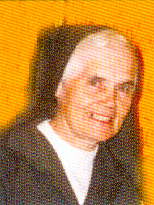 Mary was born in Dalziel, Lanarkshire. She felt a call to religious life and asked to be admitted into the Good Shepherd Order. She was sent to France to begin her training, but in 1940 she was interned with seven other sisters of different orders. For four years she suffered great hardship, which left its mark on her. In an exchange of prisoners in 1944 she was eventually able to come home to Scotland. There she worked as a dressmaker. In 1956 she asked to be admitted to the Salesian Sisters. In 1977 she went to Australia to teach, and greatly enjoyed this experience. After five years she came back to England, and was school chaplain in Liverpool. When she retired from School she moved back to Scotland to the community in Milton. When her health began to fail she moved to Cowley. The Sisters visited her regularly during the last months, when her health deteriorated. She will be remembered for her directness and honesty, and for her great love of Don Bosco and Our Lady. She died on 28th April.
Mary was born in Dalziel, Lanarkshire. She felt a call to religious life and asked to be admitted into the Good Shepherd Order. She was sent to France to begin her training, but in 1940 she was interned with seven other sisters of different orders. For four years she suffered great hardship, which left its mark on her. In an exchange of prisoners in 1944 she was eventually able to come home to Scotland. There she worked as a dressmaker. In 1956 she asked to be admitted to the Salesian Sisters. In 1977 she went to Australia to teach, and greatly enjoyed this experience. After five years she came back to England, and was school chaplain in Liverpool. When she retired from School she moved back to Scotland to the community in Milton. When her health began to fail she moved to Cowley. The Sisters visited her regularly during the last months, when her health deteriorated. She will be remembered for her directness and honesty, and for her great love of Don Bosco and Our Lady. She died on 28th April.